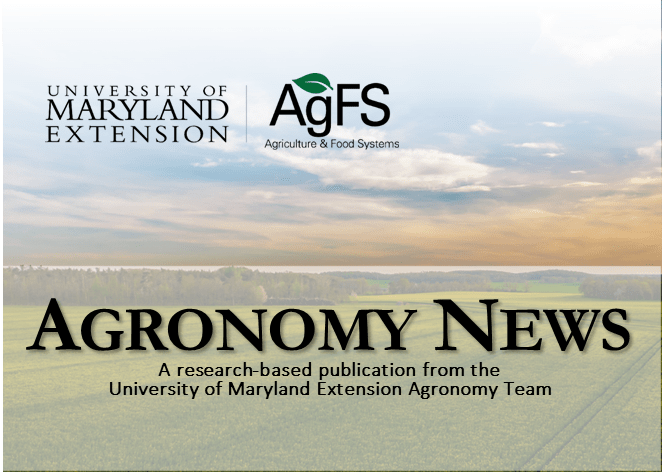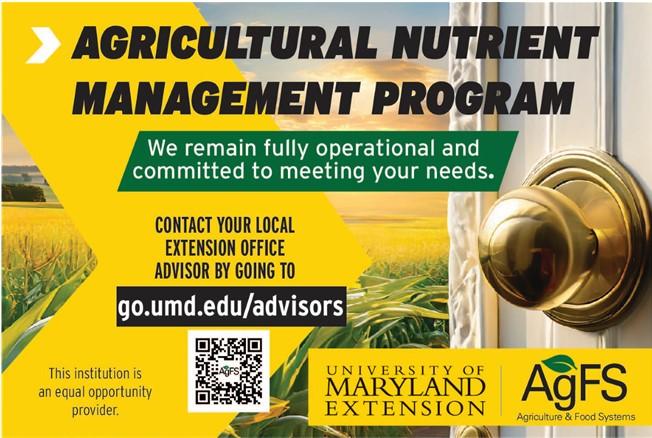
April 2025 | Volume 16, Issue 1
Inside this Issue:
- Evaluating Early Soybean Planting to Fit Fieldwork Logistics
- University of Maryland Researchers Encourage Farmers to Participate in TAPS Program
- Grain Marketing Site Updated for 2025: Field Crop Budgets, Custom Rates, and more.
- Interim Final Rule Limits Beneficial Ownership Interest Reporting To Be Limited to Foreign Companies
- Small Grain Disease Resources
- University of Maryland Extension Looking to Scout Your Late Season Cover Crops!
- NRCS Maryland Announces Additional Signup for Conservation Stewardship Program
- April 2025 Grain Market Report



Researchers at the University of Maryland are inviting growers across the state to participate in their University of Maryland – Testing Ag Performance Solutions (UMD-TAPS) program this year. The program is supported by the Maryland Soybean Board and will run throughout the summer. Piloted at the University of Nebraska-Lincoln, the TAPS program provides farmers with a zero-risk opportunity to advance their agricultural management skills and knowledge. It serves as a growing season contest and research framework, designed to uncover how producers’ management decisions drive crop yields, farm profitability, and input-use efficiency.
Growers must make decisions about variety selection, fertility, pest management, and irrigation and their management decisions will be executed in small plots at the Wye Research and Education Center. Decisions made by all participants will be executed in one field, in a true head-to-head competition. The goal is to identify which suite of management decisions will become the most profitable, efficient, and highest yielding.
Researchers at the Maryland Agricultural Experimentation Station (MAES) Wye Research and Education Center will lead the program and gather data on each plot to share with farmers. When the season ends, growers will participate in an awards dinner where they will gain access to valuable data sets to help them enhance their agricultural operations. The irrigated corn competition is limited to 20 teams and the irrigated soybean competition is limited to 15 teams. Due to limited availability, researchers urge teams to sign up as soon as possible.
Interested applicants can sign up by following this link:bit.ly/UMDTAPS25. For any questions, please reach out to Dr. Nicole Fiorellino at nfiorell@umd.edu.
Handy Bt Trait Table for U.S. Corn Production (Updated mid-March 2025)
This information is free online by going to https://www.texasinsects.org/bt-corn-trait-table.html
Pesticide Recertification Workbook
A team of Extension agents from University of Maryland, University of Delaware, and Penn State have produced a workbook for applicators that do not have access to our virtual training materials. This workbook is intended to give Maryland Private Pesticide Applicators the recertification training (4 credits) needed to renew the applicator’s license. Topics covered in this workbook are MDA-approved and are equivalent to two hours of in-person training needed every three years to renew your private applicator’s license. This workbook is also approved for three (3) Delaware credits and two (2) core Pennsylvania credits. In order to receive credit, you must complete the entire workbook. At the end of the workbook, you will answer a 30-question quiz and return it to the Baltimore County Extension office. To order your free workbook, please call the Harford County Extension office at (410) 638-3255.
ECAP Payment Applications are Open

USDA’s Farm Service Agency is issuing up to $10 billion in direct payments to eligible agricultural producers of eligible commodities for the 2024 crop year through the Emergency Commodity Assistance Program (ECAP). These one-time
economic assistance payments will help commodity producers mitigate the impacts of increased input costs and falling commodity prices. Producers can apply online here or go to your local FSA office. The application deadline is August 15th. Eligible producers will be paid $42.91/acre for corn, $29.76/acre for soybeans, and $30.69/acre for wheat. Other eligible crops include sorghum and barley, among others. Find more information here.
Field Crop Weed Management Reports
A full, detailed report of the 2023 University of Maryland field crop weed management trials can be downloaded online at the link below. The report contains data from herbicide trials for corn, soybeans, small grains, vegetables, and more. The 2024 report will be available for download later this summer. Contact Kurt Vollmer at kvollmer@umd.edu or (443) 446-4260 with questions or to obtain a hard copy.
University of Maryland Extension Looking to Scout Your Late Season Cover Crops!
By Emily Zobal, Agriculture Agent Associate | ezobel@umd.edu
University of Maryland Extension, Dorchester County
University of Maryland Extension is in its second year of a Maryland Soybean Board-funded research project investigating what insects may be using late-season cover crops as overwintering habitats and what that means for the following cash crop. We are looking for cover crop fields to scout on the Eastern Shore of Maryland, which will not be terminated until the end of April or May. If you have a field/fields you’d like us to scout or for more information, please contact Emily Zobel by email at ezobel@umd.edu or by phone at (410) 228-8800. Thank you to the Maryland Soybean Board for funding this research project.
Events
Ag Integrated Pest Management Webinar Series
Learn effective integrated pest management techniques to enhance your farming practices and improve crop yields. Maryland pesticide credits are available. Third Thursday of every month form 12-1 p.m. For more details and registration, visit go.umd.edu/ipmwebinar

Download Agronomy News, April 2024, Volume 16, Issue 1 (PDF)
Agronomy News is a statewide newsletter for farmers, consultants, researchers, and educators interested in grain and row crop forage production systems. This newsletter is published by the University of Maryland Extension, Agriculture & Food Systems Agronomy Team every month during the growing season and will include topics pertinent to agronomic crop production. The subscription is free.